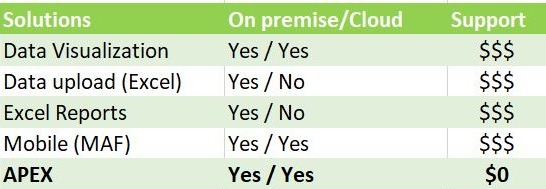Oracle E-Business Suite is the Enterprise Resource Planning system of choice for thousands of businesses. A well-rounded Oracle product, it performs just about every business function a medium to large business could require, and is notable for its strong procurement, accounts receivable, accounts payable, as well as MRP and inventory modules. Oracle E-Business Suite will continue to be updated and fully supported by Oracle through till 2030. This is welcome news to the many businesses that depend on it. The fact remains, however, that EBS is several years old and has the disadvantage of having inherited a certain amount of 1980s technology, which is still part of it today. Extending E-business Suite applications has become an increasingly sought after method to overcome this technological gap.
A need for Modernization
Users familiar with the EBS system can testify that there are opportunities for “modernization”. Navigation through its business processes can sometimes be quite complex. Organizations using EBS feel pressure from users to provide more modern and efficient tools to do their work. The problem is that there is a limit to the number of improvements that can be performed on the system with the tools EBS provides. Of course, it isn’t just a question of satisfying users. Likewise, organizations must continually look for ways to reduce their transaction times and operational costs.
Opportunities for improvement in EBS
What opportunities exist inside EBS to satisfy both user and Company requirements? Internal processes such as data entry or generating reports. Other processes such as validations, the number of steps per process and system default value settings are all things that should be looked at.
Additionally, organizations could profit from reducing the time it takes to train people on their processes. An intuitive UI could also accelerate learning.
Mobile Applications
In parallel to this, there is also a growing demand for mobile applications. For example, more and more users are adopting tablets as their main computer because of their convenience and portability. More people are using smartphones in the ERP context. Responsive application design is now almost a requirement.
External Data
Integrating external data into EBS is yet another concern. Data sources have multiplied over the years and EBS certainly isn’t the single source of a company’s information. That said, the days of using Excel sheets or word documents to exchange information between systems should have been over long ago. There is much efficiency to be gained and errors to be reduced if such information is moved through Web services as they offer much better performance and security, not to mention convenience.
Products designed to meet these needs
There are products on the market designed to “modernize” EBS. Here are some of the available product types and functionalities.

Data Visualization products allow you to create interactive reports and dashboards. Excel Data upload products allow you to work with spreadsheets to perform data entry transactions into EBS. Excel Reports is the same idea except in reverse from EBS to spreadsheets for financial information. Oracle Mobile Application Framework (MAF) (now called autonomous mobile and cloud-enabled) ) is a mobile application framework to develop single-source applications for Apple iOS, Android and Microsoft Windows 10 platforms.
You can imagine that these are all fairly expensive options. 4 out of 5 of these types of products has upfront costs as well as ongoing support costs. The last product on the list has neither.
That last product is Oracle Application Express, Oracle’s Rapid Application Development platform. Oracle APEX comes with the Oracle Database, and the database license covers it. Your enterprise has nothing to pay to start developing with it or use it. There are no additional support costs.
Rapid Application Development (RAD) sometimes referred to as “Low Code”, prioritizes rapid prototyping and user involvement. In other words, development is fast, and users test the results and provide feedback. The cycle is repeated (quickly) until users, project owners and other stakeholders are satisfied with the results. The magic of Oracle APEX is that it enables experienced developers to quickly extend EBS applications while preserving the integrity of the EBS system. APEX is fully supported by Oracle and it is optimized to exploit all the features of the Oracle database and scale with it as well. It also shares the same secure environment. What’s more, EBS developers familiar with PL/SQL will quickly adapt to APEX’s declarative framework.
A Solution Many EBS clients Are Already Using
Many companies with Oracle E-Business Suite systems have now adopted or are now at least experimenting with Oracle Application Express for their software development. There are very good reasons for this:
- APEX applications can act as process accelerators. In EBS, some transactions require the user to click through several windows before completion. APEX’s Web-based and intuitive interface minimizes the number of steps involved in a process.
- APEX provides much more flexible reporting. Its interactive reports allow to add or remove columns, apply filters, create subtotals etc., without having to re-start the report.
- Thanks to responsive design, any application built in APEX is automatically compatible with phone, tablet or desktop computer, significantly reducing development time and helping business processes adapt to the growing requirement for mobile.
- Unlike EBS, APEX also includes easy to develop web portals and dashboards either for internal users or for clients with whom your business wants to establish tighter collaboration. Right out of the box, these elements are intuitive and powerful, allowing users to quickly get down to the business issue at hand. For developers, this represents enormous time savings by eliminating the complexity of programming from the ground up.
The fact that Oracle APEX is a 100% Oracle product also allows it to integrate seamlessly with your system and provide consistent performance with support that matches that of both your database and EBS system. What’s more, it can work just as well in the Cloud as on-premise
In my next blog, I’ll show you a high-level picture of Oracle APEX architecture and illustrate how it can address your EBS needs. I’ll also define the ingredients for successful APEX integration with EBS.
Next in This Series
APEX – A Well-Integrated Web-Based Oracle Tool for EBS Development
Oracle APEX – Web-Based UX for EBS Business Requirements
Web Services for E-Business Suite – Using Oracle APEX to Move into the Future

